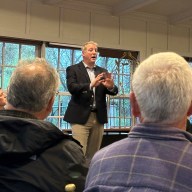This is a busy time for Whit Stillman. He has an Amazon show, “The Cosmopolitans,” in the works. His first three films — the indies “Metropolitan,” “Barcelona” and “The Last Days of Disco” — are newly out on Criterion. And last but not least, he’s got “Love & Friendship,” in which a filmmaker in love with droll dialogue and lovelorn bourgeoisie characters finally gets to do a Jane Austen movie. Greatly expanding upon “Lady Susan,” an unfinished epistolary novella from her teens, it reunites him with his “Disco” star Kate Beckinsale as a 30-something widow scheming for a new husband. Together they make an Austen film that’s more funny than romantic. Stillman, now 64, is still very Stillman: Witty, refined and very particular in his tastes. He still never swears and he hates downer films. How often do you see new movies? RELATED: Chloe Sevigny talks Whit Stillman, missing old, cool New York Onto “Love & Friendship,” which is not just a Whit Stillman film but a Jane Austen film as well. You actually had to invent your own dialogue. How on earth do you write Austenese without freaking out? We considered [“Lady Susan”] an incomplete, flawed work. But within it are among her best writing. There’s beautiful sentences, beautiful paragraphs that are very humorous. Wherever possible, if it worked as dialogue it would be in our movie. And the other stuff tends to be invented. She describes Lady Susan romancing and emotionally seducing Reginald. They’re having all these talks and conversations. I had to write the meat of that. That is new. Then a lot of the stuff with Sir James Martin is new. There’s one letter from Catherine Vernon where she described how absurd he was but doesn’t say what he was saying. Sir James Martin is a good grotesque. Were you worried about going too far with him? There’s a long, very funny bit where he won’t shut up about thinking the name “Churchill” is two words: “church” and “hill.” RELATED: Review: “Sunset Song” is another rapturous Terence Davies masterpiece This also doesn’t have a lot of the stuff you see in Jane Austen cinema. There’s no proposal scene… I was sad that the British distributor chose to do an initial ad campaign that was all pander. If you say, “Well, I’m going to sell this film as a super-romantic period film, very sentimental and emotional,” that means the people who might not like our sketch comedy [version] are not going to come. So you get bad word of mouth. You should get the right audience and that audience says it’s good. If you make it seem super-Barbie doll feminine, “let’s dress up a doll in 18th century clothes,” then guys aren’t going to go. Except the guys who are interested in dolls’ clothes. RELATED: A mini-oral history on Whit Stillman’s “Metropolitan,” on its 25th anniversary I once spoke with Taylor Nichols, one of the stars of “Metropolitan,” and he said back in the early ’90s you had toyed with making a Western, which never happened. Is this true? Follow Matt Prigge on Twitter @mattprigge
Pretty much never. I see almost nothing. I see things on planes. I used to get an Oscar season depression. You’d hear great things about these movies, but they’re not all movies you’d go to on your own — serious, depressing movies I avoid like the plague. But I better watch it, because people are taking it seriously. If you’re an Academy voter they invite you to these seductive evenings. It’s dinner at Le Cercle with these great writers. And then there’s Film X. Never in your life would you want to see Film X. So you’d see Film X and then have dinner with Salman Rushdie, and it’s like, “Eugh.” So I decided at a certain point I would only go if I really wanted to see the movie. It’s soul-destroying to watch films that are not your cup of tea.
Yeah, blame it on her. It’s all her fault, not mine.
I actually saw the original manuscript yesterday. I got a chance to go to the Morgan Library, where they have it. It’s the only full manuscript in existence. I’m really glad I didn’t see it before I wrote this, because I would have been too much in awe. It’s like a religious experience to see it. You’re in awe of her hand, her beautiful copy, the beautiful letter “c” that she had. It was also in a composition notebook, which was from some time in 1805, when she copied over the [novella]. I think that means she could have been working on it far later than 1795 [when she allegedly first wrote it]. She’s not a secretary doing calligraphy of someone else’s work. It’s her work. If there’s a paragraph she didn’t like, she could leave it out. If there’s a sentence she didn’t think was quite right she could change it — I would think.
I’m not sure I’d say “grotesque,” but I know what you’re getting at. I think you’re using “grotesque” in an ancient literary way, which is really nice. But now when we say “grotesque” we think of certain political candidates.
It’s a really long scene and I know the material’s really weak. But it’s [Tom Bennett’s] performance making it good and funny. We thought it went on too long. He goes back and repeats “Church” “Hill.” We tried to cut out the repetition. Then we left it in, and we saw that it really played. It’s good that it’s so long. It would have been a mistake to chop it shorter. It wouldn’t have been as funny.
We have a break-up and not a proposal.
Were there staples of Jane Austen movies — the moony declaration, men emerging from lakes, etc. — you were conscious about not including?
It’s just that I hate so much all that stuff. There was no way in heck it was going to enter into our film. We were not going to have pandering. No pandering, no pandering, no pandering. But on the other hand, we’re respecting certain bases. So there’s going to be a wedding scene. There’s going to be young lovers, and old lovers. Things like that. No pandering was the model for our film. Because I see pandering all over the place.
Yes, I wanted to make a Western, but one with an historical aspect … I met at one point with the creator of “Bonanza” to try to get that — the classic project which bounced around town without getting very far, so far as I could see. I do have ideas for historical adventure films but I don’t know if I can write anything that is not essentially a comedy.
Whit Stillman wants boys to see his Jane Austen movie as well

Getty Images


















